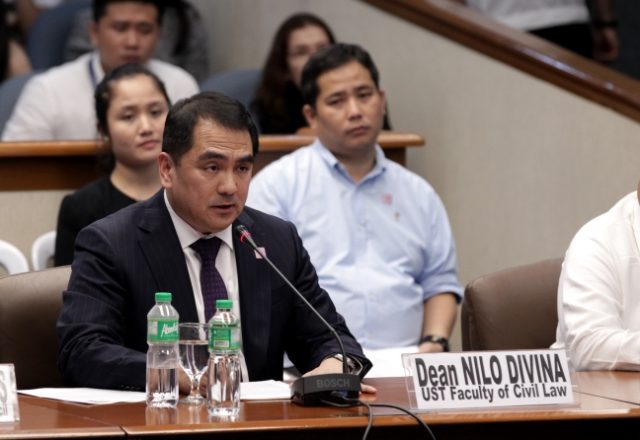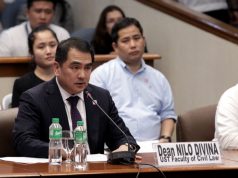MANILA – Senators are pushing for a ban on hazing as the Senate Committee on Public Order and Dangerous Drugs began its inquiry on Monday into the death of University of Santo Tomas law freshman Horacio Castillo III, allegedly during hazing, or initiation rites by the Aegis Juris fraternity.
The legislators are likewise moving to reform the 1995 Anti-Hazing Law.
According to Senator Win Gatchalian, citing Philippine National Police statistics, from January 2002 to September 2017, there were 117 reported incidents of hazing involving 419 suspects – only 15 of whom had been convicted.
He lamented that House Bill 5760, which was meant to replace the anti-hazing law, was passed on the third and final hearing in the 16th Congress but didn’t make it to the Senate in time.
“An act prohibiting hazing and regulating other forms of initiation rites of fraternities, sororities, and other organizations, and providing penalties for violations thereof, repealing for the purpose Republic Act No. 8049,” according to a report in the Philippine Star, would ban all forms of hazing activities of fraternities, sororities, and all other organizations.
“No one deserves to die from hazing,” said Senator Migz Zubiri, adding that he believed possibly more people had died due to hazing than had been reported, and so he was calling for the ban of what Gatchalian called a “sick evil”.
Meanwhile, University of Santo Tomas Faculty of Civil Law Dean Nilo Divina said that hazing was an activity prohibited by the school, and acknowledged that Aegis Juris, the fraternity which Castillo joined and is being blamed for his death, violated RA No. 8049, or “An Act Regulating Hazing and other forms of Initiation Rites in Fraternities, Sororities, and other Organizations and providing penalties thereof.”
Nevertheless, said Divina, “I don’t think there’s something wrong with joining fraternities. It is a very noble organization.”
He explained that fraternities exist for lawful purposes, to foster brotherhood and camaraderie, and for members to provide support to one another.
He insisted that, while hazing was “wrong on all accounts,” it was not synonymous with fraternities.
Divina added that one of the first things he did when became dean was to take a leave of absence from Aegis Juris so that his actions would not be perceived as done under a “cloud of bias”.
The only time he interacted with the fraternity, he said, was during a basketball game between his law firm, DivinaLaw, and the fraternity. He stressed that he played for the team of his law firm.
Despite this, Senator Joel Villanueva, a UST alumnus, told Divina, “Unfortunately, Atio died on your watch.”
“Pinatay na, ninakawan pa (Not only killed, but he was robbed, too),” Villanueva added.
Some members of Aegis Juris were present at the hearing, as well as Castillo’s parents. Former Senator Joey Lina, the author of the anti-hazing law, was also present.
Meanwhile, upon questioning by Senator Grace Poe, Manila Police District Director Senior Supt. Joel Coronel acknowledged there were reports that fraternity members involved in Castillo’s death were being coddled by senior members after the incident, but Coronel added that he could not reveal their identities because they were still subject to investigation.
Poe then asked if a senior member was present at the plenary hall. He replied, “I have no direct evidence as of now regarding that particular …”
Poe prodded further, saying that, indeed, one senior member of the fraternity was at the plenary hall.
Coronel backed away from his microphone and laughed.
To this, Poe replied, “Hindi mo sinagot, so siguro naririto nga (You didn’t answer my question, so maybe he is here indeed).”
Coronel also reported that, on the first day of the bar exams last year, September 4, Aegis Juris got involved in a fracas at the Manila Hotel with another UST fraternity, Gamma Delta.
Nothing to do with killing: Solano
John Paul Solano, one of those tagged as suspects in Castillo’s death, claimed he had nothing to do with the killing. Asked by Poe if it was because of his medical background that the fraternity got in touch with him, he replied, yes.

Lacson presented an exchange of Facebook messages, supposedly among the fraternity members, from September 17.
One message, sent on Sunday at 9:11 a.m., was from a certain Axel: “Emergency, pwede hingin number ni Popoy (can I get Popoy’s number)?”
Lacson asked Solano if he was Popoy, to which Solano replied that Popoy was his nickname, but he could not say if he was the Popoy being referred to.
A member of the group chat replied with the number. Another member said, “Delete niyo na muna o (Delete this first),” while other messages read, “Code of silence, manahimik na lang muna lahat (Everyone keep quiet for now),” and “Deactivate kayo account (Deactivate your accounts).”
Coronel said the PNP’s cybercrime unit was in the process of authenticating the messages.
CCTV near frat library showed “blank” screen
Asked by Senator Bam Aquino if they were able to obtain CCTV footage from Bernardo, Fuentes, and Associates, an office next to the fraternity library in a privately-owned building where the hazing rites supposedly occurred, Coronel said they were given the video recording on Monday.
Upon review by police investigators, however, “there was nothing to be shown. Blank.” Coronel said they would have the video recording examined by technical experts to see whether data had been erased.
Members of the fraternity who attended the hearing were asked what they knew about the killing of Castillo.
Jason Adolfo Robinos, a fifth year law student, said he first learned about the incident on September 17 at around 6 p.m. to 7 p.m., when a fraternity brother texted him about a neophyte who had gone unconscious. “You better be on guard,” the text read. Robinos said he learned over the radio that Castillo died the following day.
Divina, meanwhile, stressed that he was not aware there would be hazing rites on that date.
Asked for a statement for students who wished to surface about what they knew, but couldn’t because of the perceived influence of Aegis Juris over the school, Divina said that he had rendered many decisions that were against the fraternity, and was not like some of its members (presumably who were protective of it).









